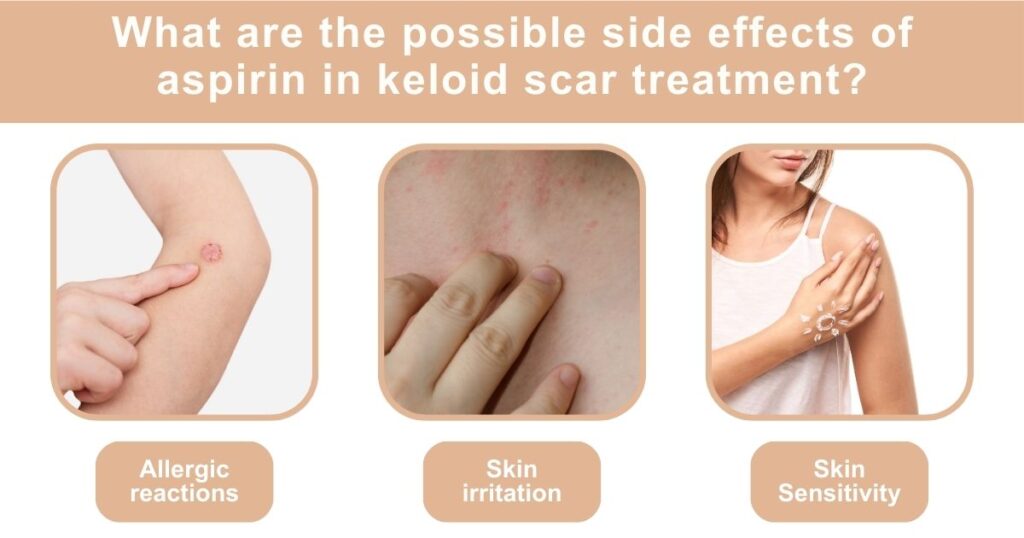Every year, countless individuals contend with keloid scars. Enter aspirin, a standard household medicine has found its place in keloid scar removal treatment . How effective is aspirin in Advanced keloid treatment? What’s the science behind it?
The Emergence of Keloid Scars
Keloid scars are distinctive, raised overgrowths of scar tissue at the site of skin injuries. They emerge from the body’s excessive response to trauma or inflammation. Though these scars pose no direct health threat, they often result in cosmetic concerns and emotional distress.
Dubai Keloid Treatments are special procedures done in dubai to help reduce and remove keloid scars. these treatments make your skin smoother and healthier.
Why Aspirin? Aspirin’s Anti-Inflammatory Properties
Pain relief and inflammation reduction are two of aspirin’s most well-known uses. Particularly noteworthy in terms of treating keloid lesions is aspirin’s anti-inflammatory effect. It is logical to look into anti-inflammatory drugs like aspirin to treat these difficult scars since inflammation is a major contributing component in developing keloid scars.
Book A Consultation With Dr Shehzadi Tasneem
Top-rated Plastic Surgeon For Keloid in Dubai
Installment Plan Available
Aspirin in Keloid Scar Removal Treatment: The Research Perspective
Research into aspirin’s role in keloid scar treatment has brought forward promising results. This section covers key studies, their findings, and what it could mean for those living with keloid scars.
Research Spotlight 1: Topical Aspirin for Keloid Management
A study published in the Journal of Dermatological Treatment assessed the efficacy of a topical aspirin solution in keloid scar management. The findings indicated that the aspirin solution significantly reduced keloid volume and associated symptoms, offering a beacon of hope for those grappling with keloids.
Research Spotlight 2: Aspirin and Steroids – A Potent Duo?
Another intriguing study in the Journal of Plastic, Reconstructive & Aesthetic Surgery investigated the combined effect of aspirin and steroids in keloid treatment. The results highlighted that this powerful duo might be more effective than steroids alone, making it an exciting area for future research.
Application of Aspirin in Keloid Scar Treatment: Practical Implications
It’s important to comprehend science and research, but how can we use this information in practical situations? The practical application of aspirin in treating keloid scars is examined in this part, along with aspirin’s forms, applications, and possible negative effects.
Topical Aspirin: An Easy Solution
The most common form of aspirin used in keloid scar treatment is a topical solution. This is often applied daily directly to the scar. This method’s simplicity and non-invasive nature make it an attractive option for many.
Possible Side Effects: A Word of Caution

Although taking aspirin is mostly safe, being aware of any potential adverse effects is vital. These might include allergic reactions in people with sensitive skin or skin irritation. Prior to beginning any new treatment, always seek medical advice. Overview of Cryotherapy Scar Eradication is about a cool treatment that uses extreme cold to remove scars. It’s like using ice to make bad skin marks disappear! Keloid Scar Prevention: Rapid Advice for Flawless Skin is a guide to help you avoid thick, puffy scars and keep your skin looking perfect. It’s easy to understand, even a 5th grader can follow it!
Eliminating Mature Keloid Scars means getting rid of old, raised scars that can grow much larger than the original wound. It’s like removing big, bumpy marks on your skin that have been there for a long time. Eliminating facial keloids means getting rid of the thick, raised scars on your face, so your skin looks smooth again. Removing keloid scars means getting rid of thick, raised scars that grow bigger than the original wound. Doctors can use treatments like surgery, creams, or special injections to help make them go away.
Keloid scar surgery Dubai helps remove thick scars on your skin making it look smoother and better Keloid removal nose piercing is when doctors help take away a big bump that grows on your nose after you get it pierced
Keloid Scar Pain Relief helps to reduce the pain and itching from thick raised scars on your skin making you feel more comfortable Facial Keloid Treatment: Skin Renewal helps smooth out bumpy scars on your face making your skin look better and feel softer
Keloid ear elimination is a way to remove extra scar tissue that grows on ears after piercings or injuries Doctors can use different methods like surgery or special treatments to get rid of these bumps and make ears look normal again Surgical wound overgrowth happens when extra tissue grows around a cut from surgery This can slow down healing and make the scar bigger than it should be
Keloid prevention techniques Avoid getting piercings or tattoos and keep wounds clean and covered to help stop keloids from forming Applying silicone sheets or gels to healing skin can also reduce the chance of keloids developing
How Does Aspirin Stack Up Against Other Common Keloid Treatments?
This section provides a comparative analysis, considering effectiveness and accessibility.
Aspirin vs Steroid Injections
Steroid injections are a standard treatment for keloids. However, they can be painful and may require several sessions. In contrast, topical aspirin is less invasive and can be applied in the comfort of your own home. However, it’s worth noting that research suggests a combination of aspirin and steroids may offer the best outcomes.
Aspirin vs Surgery
Surgery can be effective for removing larger keloids, but there’s a significant risk of the keloid returning, sometimes even larger than before. Aspirin offers a non-surgical alternative, which, while slower, may pose less risk of recurrence.
What Does the Future of Aspirin in Keloid Scar Treatment Hold?
With a growing body of research supporting aspirin’s role in keloid scar treatment, what does the future hold? This section peers into the crystal ball, exploring potential advancements and challenges in this field.
Emerging Research and Potential Developments
While current research provides promising evidence, more extensive, well-controlled studies are needed to solidify aspirin’s place in keloid treatment dubai . Further investigation into aspirin’s use in combination with other treatments could also unlock new, more effective treatment strategies.
Challenges and Considerations
Despite the promise of aspirin, there are challenges to consider. For one, not everyone responds to aspirin treatment. Furthermore, aspirin’s effectiveness may depend on the keloid’s age, size, and location. Navigating these challenges will be crucial for the future application of aspirin in keloid scar treatment.
While the use of aspirin in keloid scar removal treatment has shown promise, it is crucial to understand that every individual’s skin response differs. Hence, an individualised approach considering a patient’s specific needs and medical history should always be pursued when dealing with keloid scars.
For those struggling with keloid scars, remember, you are not alone. There is a growing array of treatment options available, including aspirin. Seeking professional advice can make a difference in managing and treating your keloids.
Don’t let keloid scars dictate your life. Take the first step towards reclaiming control of your skin. Why not book a consultation with a professional who can guide you on this journey? Dr Shehzadi is an experienced professional who can offer personalized advice tailored to your needs. By understanding your unique circumstances, she can help determine if aspirin could be an effective part of your keloid scar treatment plan.












